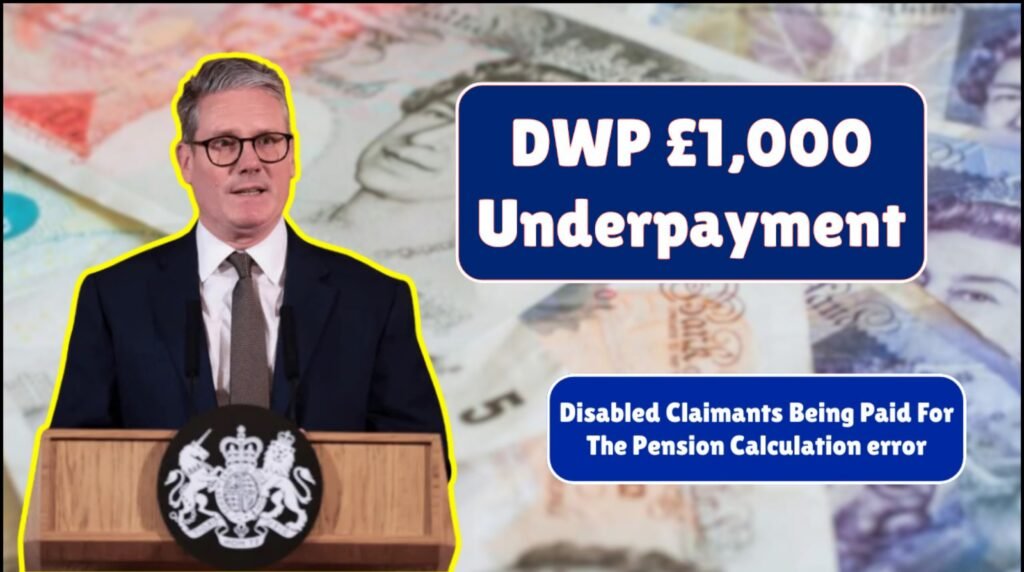Thousands of disabled people in the UK could be missing out on payments worth up to £1,000 from the Department for Work and Pensions (DWP). A recent update has revealed that some claimants may have been underpaid due to calculation errors or unclaimed entitlements. If you are receiving disability benefits, it is worth checking your records immediately to see if you are owed money.
Why The DWP Might Owe You Money
The DWP has admitted in recent years that certain groups of claimants were underpaid due to processing mistakes, changes in benefit rules, or delays in backdated payments. In some cases, these errors have gone unnoticed for months or even years. While the DWP is working to correct these mistakes, many people will only get what they are owed if they actively check and raise the issue.
Who Could Be Affected
Disabled people receiving certain benefits are the most likely to be impacted. This includes claimants of Personal Independence Payment (PIP), Employment and Support Allowance (ESA), Disability Living Allowance (DLA), and some Universal Credit recipients with limited capability for work. Past reviews have shown that people moving from older benefits to newer ones were at higher risk of payment errors.
The £1,000 Figure Explained
The potential amount you could be owed depends on your individual circumstances. For some, it could be a few hundred pounds, while others may be entitled to over £1,000 in back payments. These amounts can build up if the error has been ongoing for several months or years. For example, if a claimant was underpaid by £20 a week for a year, they would be owed £1,040.
How To Check If You’re Owed Money
If you think you might have been underpaid, start by reviewing your award letters and payment history. Compare the amounts you have received with the official rates for your benefit and level of award. You can find the correct rates on the official government website or by contacting the relevant helpline.
If you spot a difference, contact the DWP immediately and ask for a payment review. This process is sometimes called a “mandatory reconsideration” if you believe a decision has been wrong from the start, or a “payment check” if you believe the amount is incorrect.
Common Reasons For Underpayment
There are several reasons why disabled claimants might be underpaid:
- Errors in calculating benefit entitlements
- Missing medical evidence or incorrect assessments
- Not being informed about a qualifying element, such as the Severe Disability Premium
- Delays in processing backdated claims after benefit changes
Understanding these factors can help you identify whether you might be entitled to a payment review.
Examples Of Past Payouts
The DWP has previously admitted to large-scale underpayments. In one case, a review of ESA payments found that over £500 million had been underpaid to tens of thousands of people over several years. Individual payouts ranged from £100 to over £10,000 depending on the case. This shows that even if you think the amount might be small, it is worth checking.
How To Contact The DWP
You can contact the DWP directly by phone, post, or through your online account (if your benefit allows it). Be prepared to provide your National Insurance number, details of your benefit award, and evidence of why you believe you have been underpaid. If you struggle with communication due to a disability, you can request reasonable adjustments, such as a text relay service or a home visit.
What Happens After You Make A Claim
Once you request a review, the DWP will examine your case. This can take several weeks or even months depending on complexity. If they find you have been underpaid, they will issue a backdated payment directly to your bank account. In some cases, they may also adjust your future payments to the correct rate.
Backdating Rules You Should Know
If the DWP agrees you were underpaid due to their error, they usually backdate payments to the date the mistake began. There is generally no time limit for backdating when the fault lies with the DWP. However, if the underpayment is due to you not providing information or applying late, backdating may be limited.
Impact On Other Benefits
If you receive a backdated payment, you might worry it could affect other benefits. Most back payments from the DWP are treated as one-off payments and will not count as income for means-tested benefits if spent within 12 months. However, it’s important to report any lump sum to your local council or relevant benefit office.
When To Seek Independent Advice
If you are unsure whether you have been underpaid, or if the DWP rejects your claim, it may be worth getting help from an independent advice service such as Citizens Advice, Disability Rights UK, or a welfare rights officer. They can review your paperwork and help you challenge decisions.
Why Acting Now Matters
The sooner you check your payments, the sooner you can claim what is rightfully yours. Delaying could mean missing out, especially if your circumstances change in the future. Even if you are not currently affected, understanding the system can help you avoid mistakes going forward.
Final Thoughts
If you are a disabled claimant in the UK, you could be owed a significant amount of money from the DWP due to past underpayments. With some people receiving over £1,000 in backdated benefits, it is essential to check your records and take action. By reviewing your payment history and contacting the DWP for a review, you can ensure you get every penny you are entitled to.
